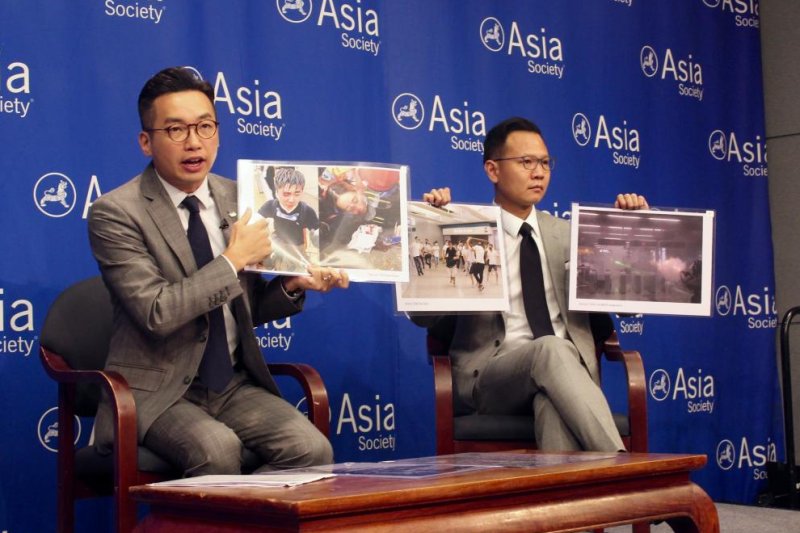Alvin Yeung (L) and Dennis Kwok (R) hold up photos of protesters who were the targets of police brutality in Hong Kong during a discussion at the Asia Society in New York on Thursday. Photo by Elizabeth Shim/UPI
NEW YORK, Aug. 15 (UPI) -- Hong Kong's progressive lawmakers say they are seeking reform within the existing policy of "one country, two systems" that binds their city-state to mainland China, even as the Beijing-friendly government of Hong Kong Chief Executive Carrie Lam allows police to employ brutal measures against protesters.
In an appearance at the Asia Society on Thursday ahead of possible meetings with members of the U.S. Congress, Alvin Leung and Dennis Kwok, both members of Hong Kong's pro-democracy Civic Party, blamed Lam and her administration for widespread anger.
Beijing is not directly responsible, they said.
"The [Hong Kong] government has failed the people for 20 years," Kwok said. "Discontent has come to a head."
The citizens of Hong Kong are particularly frustrated with a government that is unresponsive to their demands, which includes a request to set up an independent commission that could investigate police handling of the mass protests.
"Instead of going to the root of the problem, it's tear gas and court injunctions," Kwok said. "Hong Kong is ill. Hong Kong is sick."
Leung, who leads the Civic Party, the fourth-largest in the Legislative Council of Hong Kong, said Lam's government at one point declined an application for a peaceful demonstration, while turning a blind eye to gang attacks against subway riders.
"Triads were used, I would use the word 'used,' by the government in collusion with police, to attack ordinary citizens," Leung said, adding from June to August police used 1,800 rounds of tear gas, 300 rubber bullets, and arrested 603 people on charges of rioting and "unlawful assembly."
Pro-democracy politicians like Leung and Kwok could be walking a fine line between the struggles for liberties and sustaining good relations with the Chinese Communist Party.
The lawmakers said China is not to blame for the most recent wave of unrest that began with Lam's push to pass an extradition bill that would allow Hong Kong to transfer suspects to China.
"No Beijing leader ever openly mentioned extradition arrangements," Leung said. "It is not something Beijing holds so dearly to their hearts."
Kwok, who serves on a panel on justice and legal services, said he and his colleagues harbor "no hostility" toward China.
Kwok also said recent reports of Chinese troops mobilizing at the border in Shenzhen is not good news, and works against Chinese interests, which includes preserving "one country, two systems" and allowing Hong Kong to sort out its issues independently.
"It would be crazy to send troops and create a second Tiananmen Square," the lawmaker said. "We do not want to see People's Liberation Army troops on the ground."
U.S. President Donald Trump has stayed mostly silent on Hong Kong, a decision Sen. Chuck Schumer, D-N.Y., tweeted Wednesday is "unacceptable."
More recently, Trump called for a "personal meeting" with Chinese President Xi Jinping, while suggesting on Twitter Xi likely seeks to "humanely" solve the "Hong Kong Problem."
"'Humanely' is key," Kwok said. "It's important the international community support the recognition of two systems."
Leung said China is "very powerful" in placing pressure on Hong Kong, including against businesses like Cathay Pacific, which recently took action against an employee, an airline pilot, who may have been involved in the protests.
That does not mean the international community, and the United States, cannot make an impact, the lawmakers said.
The United States gives Hong Kong preferential economic and trade benefits under U.S. law. A bill passed by Congress, such as the pending Hong Kong Human Rights and Democracy Act of 2019, could potentially retract those benefits and build enough pressure for Lam to pay greater attention to citizens' grievances.
The Hong Kong government should be "extremely worried" about having special treatment from the United States taken away, Kwok said.
But the greatest change is coming from the ground up in the streets of Hong Kong, where martial arts legend Bruce Lee's mantra, "Be water," is informing and inspiring a decentralized and leaderless protest, according to Leung.
"We have free flow of information that helps Hong Kong people defend themselves," the lawmaker said.
"Hong Kong is no Beijing of 1989. We are now in 2019."















